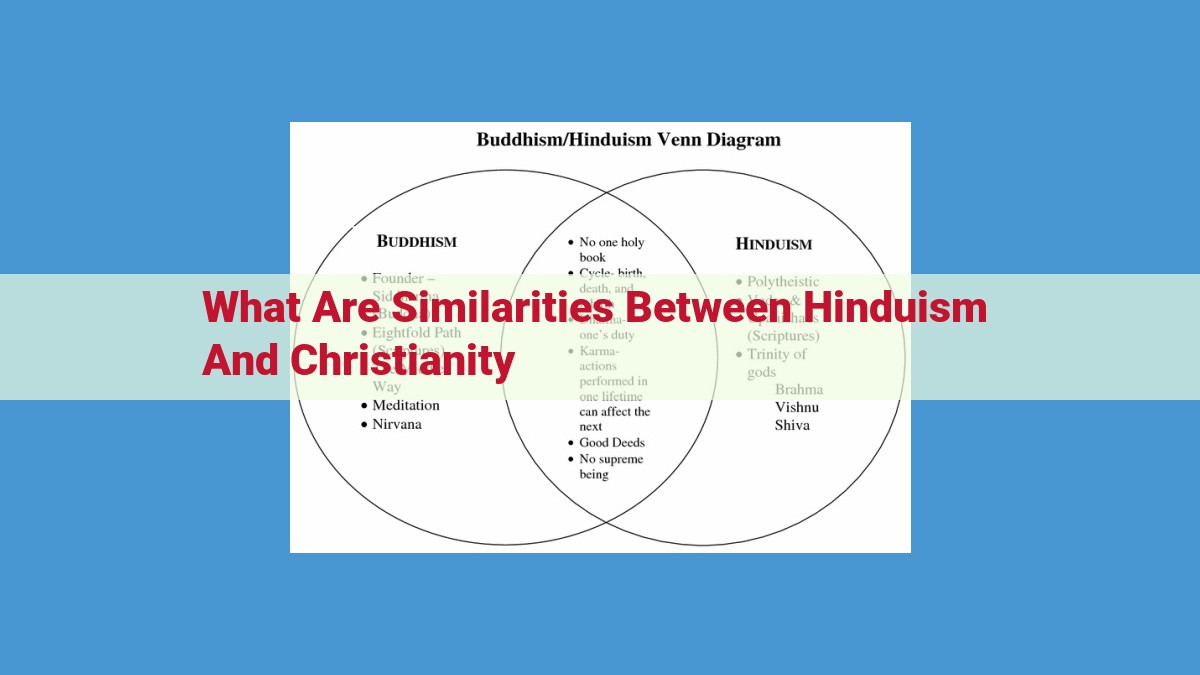<
ol>
Both Hinduism and Christianity share the concept of a supreme deity (Brahman/God the Father), the significance of holy texts (Vedas/Bible), the recognition of sin (karma/transgression), and the pursuit of salvation (moksha/redemption).
Love (bhakti/agape) and charity (dana/charity) are highly regarded in both religions.
Temples and churches serve as places of worship, while rituals such as fire offerings (yajna) and sacraments (baptism/communion) play important roles in religious practices.
Core Beliefs and Practices
- Explain the concept of monotheism in Hinduism (Brahman) and Christianity (God the Father).
- Discuss the importance of holy books (Vedas/Upanishads in Hinduism, Bible in Christianity).
- Compare the concept of sin (karma in Hinduism, transgression in Christianity).
- Explore the paths to salvation (moksha in Hinduism, redemption in Christianity).
Comparing the Core Beliefs and Practices of Hinduism and Christianity
A Journey into the Beliefs and Practices of Two Ancient Faiths
Embarking on a spiritual odyssey, we delve into the depths of Hinduism and Christianity, exploring their shared and distinct beliefs and practices that have shaped the lives of countless individuals for centuries.
Monotheism: A Foundation of Faith
At the heart of both Hinduism and Christianity lies monotheism, the belief in a single, supreme deity. In Hinduism, Brahman represents the all-pervading, impersonal force that transcends all human comprehension. Christianity, on the other hand, posits “God the Father” as the creator and sustainer of the universe, revealed through Jesus Christ.
Holy Books: Guides on the Spiritual Path
Throughout history, holy books have served as guiding lights for religious followers. Hinduism’s sacred texts are the Vedas and Upanishads, which contain ancient hymns, philosophical teachings, and spiritual insights. Christianity finds its foundation in the Bible, a collection of books spanning the Old and New Testaments, which document God’s revelation to humanity.
Sin and Karma: The Consequences of Actions
Both Hinduism and Christianity acknowledge the concept of sin, although their interpretations vary. In Hinduism, karma governs the consequences of our actions, determining the cycle of birth, death, and rebirth. In Christianity, transgression refers to breaking God’s law, resulting in separation from God.
Paths to Salvation: Seeking Redemption and Liberation
Seeking redemption and liberation from suffering is a central tenet of both religions. In Hinduism, moksha represents the ultimate goal of liberation from the cycle of rebirth, achieved through spiritual practices and knowledge of the divine. Christianity places emphasis on redemption through Christ’s sacrifice, offering forgiveness of sins and eternal life with God.
Values and Virtues in Hinduism and Christianity
Love: A Divine Connection
In the tapestry of both Hinduism and Christianity, love emerges as a vibrant thread, weaving together the fabric of faith. Bhakti in Hinduism embodies a deep devotion and adoration towards Brahman, the supreme being. It is a profound relationship marked by surrender, reverence, and an unwavering bond. Similarly, agape in Christianity reflects a sacrificial and unconditional love that flows from God the Father to all creation. It is a selfless, purifying love that transforms hearts and transcends human limitations.
Charity: A Pathway to Grace
Compassion and generosity are cornerstones of both Hinduism and Christianity. Dana, the Sanskrit word for charity, encourages Hindus to selflessly donate material possessions, knowledge, or service to those in need. It is believed to purify the giver and accumulate spiritual merit. In Christianity, charity is a virtue that extends beyond material offerings. It encompasses empathy, kindness, and a compassionate heart that seeks to uplift and support others, especially the poor and marginalized.
Structures and Rituals: Similarities and Significance
Temples and Churches: Abodes of the Divine
Hindus and Christians both find solace and connection with the divine within sacred spaces. Temples in Hinduism serve as the physical manifestations of Brahman, the supreme reality. These intricate architectural wonders are adorned with carvings, sculptures, and symbols that narrate tales of gods and goddesses. Similarly, Christian churches embody the presence of God the Father, offering a sanctuary for worship, prayer, and community.
Rituals: Pathways to Enlightenment
Rituals play a pivotal role in both religions, providing pathways to spiritual growth and connection. Yajna or fire offerings in Hinduism are ancient practices aimed at purifying the soul and invoking divine blessings. Devotees gather around a sacred fire, chanting mantras and offering grains, ghee, and other sacred substances. In Christianity, sacraments hold immense significance, symbolizing God’s grace and presence among believers. From baptism to communion, these rituals serve as tangible expressions of faith and a means of fostering a deeper bond with Christ.
The Importance of Rituals
The importance of rituals in Hinduism and Christianity stems from their ability to connect individuals with the divine and facilitate spiritual transformation. Through these sacred practices, devotees participate in a timeless tradition that has sustained faith for centuries. Rituals provide a sense of belonging, guide ethical conduct, and help cultivate a deeper understanding of the scriptures and religious teachings. They serve as conduits for divine blessings, enabling practitioners to experience the presence of the holy and the eternal.
